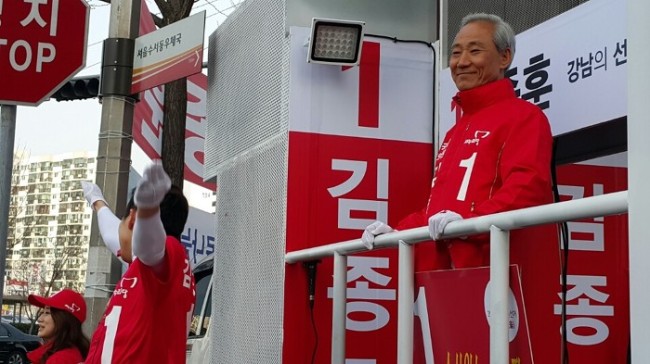[ELECTION 2016] Conservative Gangnam unmoved by election
By Yeo Jun-sukPublished : April 7, 2016 - 22:13
It is hard to feel that the parliamentary election is just around the corner for Lee Jae-jung, a 32-year-old office worker who lives in an affluent apartment complex in Dogok-dong, Gangnam in Seoul.
“I have never seen a campaign banner for political parties or a vehicle that carries candidates blasting their campaign songs and election pledges,” said Lee. “It is kind of weird because I can see those banners and vehicles a lot in other neighborhoods,” he said.
Around the complex crowded with high-rise buildings and fancy restaurants, signs of a heated race for the 20th National Assembly are nowhere to be seen. No election banners or campaign vehicles were spotted over the span of several hours. Instead, there was a placard urging the government to accelerate a residential redevelopment program, a lucrative housing project for the wealthy residents.
Gangnam, indeed, is considered the heart of the nation’s most affluent residence. Aside from the sky-high real estate prices, the monthly income of its three districts -- Gangnam-gu, Seocho-gu and Songpa-gu -- is more than any other districts in Seoul, according to Seoul city government’s statistics.
Such economic status has long turned Gangnam into the conservative’s stronghold.
In the 2012 general election, the Saenuri Party won all seven seats allocated to the region. In the election to choose Seoul’s mayor in 2010, the three districts were the only ones that chose conservative candidates over liberal contenders.
“The Gangnam voters cast their ballot in their economic interest,” said Kim Min-jeon, a political science professor at Kyung Hee University. “Though some middle-income voters might vote for liberal candidates, top-class high-income voters definitely favor conservative candidates,” she said.

Such a trend was reflected in the attitude among the candidates and their supporters toward their election campaign.
Rep. Kim Jong-hoon, the Saenuri lawmaker seeking reelection in Gangnam-gu B district, said that his aides and supporters often told him to “take a break” from the election campaign.
The supporters for main opposition The Minjoo Party of Korea’s candidates, such as Jun Hyeon-hee, the former lawmaker competing with Kim in the same constituency, suffered from weak popularity among the conservative voters.
“When we said we were from opposition candidate, the people would just walk away,” an official from Jun’s election campaign told the Korea Herald. When her supporter went onto a stage to tout her credentials and pledges, there was not a single pedestrian that stopped walking or listened to the speech.
The unwelcoming mood toward the liberals was not always the case. When former President Lee Myung-bak was in power from 2007 to 2012 with low popularity ratings, political pundits and media outlets coined the term “Gangnam leftists” and predicted that the liberal-minded high-earners would transform the region’s political landscape.
Though the idea was often dismissed by critics and failed to bring election victory to the liberal parties, there were some cracks among voters in the conservative districts. For instance, residents in Songpa district voted for the former civil activist Park Won-soon in the 2011 election for Seoul mayor
“For Gangnam voters, politics is a complicated procedure filled with rancorous debates,” said Lee Taek-gwang, a professor of cultural studies. “The challenge for the liberals is whether they can change disinterest toward politics and the system dominated by establishment conservative party,” said Lee.
Entrepreneur Shin Yeong-soo, 53, who has been a long-time supporter for the Saenuri Party, said he thinks that the party has been too “complacent” toward developing policies tailored for the region.
“When I look at the candidates’ posters describing their political careers, I couldn’t help but notice that they are not the best pool of politicians,” said Shin. In the latest 2012 election, out of seven candidates elected in the region, five were rookies.
By Yeo Jun-suk (jasonyeo@heraldcorp.com)







![[Graphic News] More Koreans say they plan long-distance trips this year](http://res.heraldm.com/phpwas/restmb_idxmake.php?idx=644&simg=/content/image/2024/04/17/20240417050828_0.gif&u=)
![[KH Explains] Hyundai's full hybrid edge to pay off amid slow transition to pure EVs](http://res.heraldm.com/phpwas/restmb_idxmake.php?idx=644&simg=/content/image/2024/04/18/20240418050645_0.jpg&u=20240419100350)





![[From the Scene] Monks, Buddhists hail return of remains of Buddhas](http://res.heraldm.com/phpwas/restmb_idxmake.php?idx=652&simg=/content/image/2024/04/19/20240419050617_0.jpg&u=20240419175937)

![[KH Explains] Hyundai's full hybrid edge to pay off amid slow transition to pure EVs](http://res.heraldm.com/phpwas/restmb_idxmake.php?idx=652&simg=/content/image/2024/04/18/20240418050645_0.jpg&u=20240419100350)

![[Today’s K-pop] Illit drops debut single remix](http://res.heraldm.com/phpwas/restmb_idxmake.php?idx=642&simg=/content/image/2024/04/19/20240419050612_0.jpg&u=)